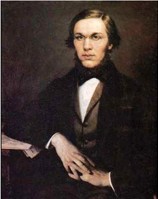
A literary critic and a poet Nikolay Dobrolyubov in historical sources of the Presidential Library
February 5, 2017, marks 181 years since the birth of Nikolay Alexandrovich Dobrolyubov – a Russian literary critic, a poet and an essayist. There are some electronic copies of various historical materials related to that literary and public figure in the Presidential Library stock.
“An individuality of Dobrolyubov should play one of the major parts in the development of our society, not only as the first very real reviewer and publicist, not only as a gifted prophet of new ideas, who has sealed with his living word an entire epoch; for all that his personality is remarkable, as a man, as a kind, which is solid, determined and able to serve as one of the brightest types of a new context, which is applied across the field of intellectual movement,” – could be read in the “Some essays on the development of progressive ideas in our society” publication issued in St. Petersburg in 1872.
N. A. Dobrolyubov lived a short life, but had managed to become a “splendor and a pride of Russian literature, a mastermind of the Russian intelligentsia of the sixties.” He is described in these words in the article published in the “Narodnyi Uchitel” (people's teacher) magazine issued in 1911 on the occasion of the 50th anniversary of the writer's death.
From the same source can be found that “the tough life in the house of the powerful and unfriendly father, who demanded unconditional obedience from all the family, terrifying the others, in an early Dobrolyubov’s age has imprinted him with an inwardness.” In order to fully outline his gloomy childhood background, only one, moreover - a festive New Year's Day, which a 15-year-old future critic has described in his diary, should be taken: “That's another year “slipped away into eternity”! And another year has passed, and my life has been shortened on another year. I met this year, which, may be said, I was waiting for with impatience, with no joy. I was hoping on it so much, and expected so many from it… But now it came, and all my hopes have fallen apart at the same its beginning. So sad, there is no fan at all!”
Featured in open access on the Presidential Library website 1931-year’s edition of The diaries. 1851-1859 allows a reader to seek an insight into poet's heart. “Dobrolyubov is usually drawn as an unemotional, cold, rational person, who doesn’t have anything with real feelings and lives only by ascetic thought. Even Dobrolyubov in person often draws himself like that. His diaries prove that all this is nonsense. Nothing human was alien to Dobrolyubov,” - V. Polyansky said in the preface.
It can be seen from the diaries, how the views of Dobrolyubov, aside of his identity, have been molding. For example, if in a diary entry from March 7, 1853, and then for the whole month the 17-year-old Dobrolyubov is lamenting his sins and mourning his “laziness to pray, absent-mindedness and frivolity, freestyle judgments, lying, cunning and popularity,” so later the breakdown in religiosity of young man could be seen, he is challenging “the main truths of salvation.” By his 19 he is already an obvious atheist, a philosopher, and a follower of materialist philosophy - he writes at nights about his acquaintance with the philosophy of Feuerbach, following the sharp controversy of Herzen with Chernyshevsky. In the same 1855 Dobrolyubov will write that he with his friends “concerns the great questions” and that they “involved more and more with theirs native Russia and with its great future,” and after two years in the January 15th record it has been precisely defined: “I am desperate socialist, who is all ready to join an unwealthy society with an equal rights right now as wait any longer.”
In 1856 Dobrolyubov met N. G. Chernyshevsky, and their strong, but regrettably short-lived friendship that was interrupted by the untimely death of Nikolay Alexandrovich, began from that time. In the article of M. Nevedomsky “On N. A. Dobrolyubov” published in 1911 in “Nasha Zarya” (our dawn) magazine, an electronic copy of which is available in the Presidential Library stock, emphasizes: “Just the same fact of their rapid mutual approach and warm friendship is enough to admit with great probability, that Dobrolyubov - this young twenty-year-old man – mental formation was led by Chernyshevsky, that the influence of the latter should be huge and comprehensive. So, whatever is unspoken by Dobrolyubov, we can surely apply to Chernyshevsky for.”
Owing to Chernyshevsky, during his studies at the Pedagogical Institute, Dobrolyubov began to get published in “Sovremennik” (a contemporary) magazine, and after graduation he became a permanent employee in it, led a satirical section and headed the department of literary criticism. This period was marked by the great literary activity of Dobrolyubov: such articles as “What is Oblomovism,” “A ray of light amongst the darkness,” “The traits to characterize Russian common people” and “When the present day will finally come?” were written. “Literary criticism was connected in Dobrolyubov’s with well-defined ideals and beliefs, with extensively developed concept of solidarity between personal and social benefits, with never leaving him desire for greater fairness in human relations. His brilliant articles were the illustrations of his “cold mind and passionate heart,” that in conjunction with the above mentioned methods of his critical engagements have at once won him a privileged position among the readers and in the editorial office,” – according to the previously mentioned article from the “Narodnyi Uchitel” (people's teacher) magazine.
Nikolay Dobrolyubov died in 1861 of tuberculosis and was buried in the “Literatorskie Mostky” (the literary workers’ footbridges) of Volkov Cemetery in St. Petersburg.

